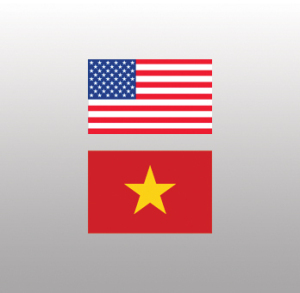United States and Vietnam Sign Agreement on the Safety of Food, Medical Products
by Barbara Kram, Editor | June 25, 2008

The U.S. and Vietnam
have a strong & growing
trade relationship that
has greatly accelerated
in recent years.
have a strong & growing
trade relationship that
has greatly accelerated
in recent years.
The United States and the Socialist Republic of Vietnam have signed a memorandum of understanding (MOU) to enhance the safety of food, feed, drugs and medical devices traded between the two nations.
The plan is the product of discussions between U.S. Secretary of Health and Human Services Mike Leavitt and senior Vietnamese officials in Hanoi just two months ago and it exemplifies the new import-safety strategy adopted by the U.S. Government in November 2007. Historically, U.S. authorities have primarily relied on intervention at the border to intercept unsafe goods. The new strategy, crafted by a Cabinet-level interagency Working Group on Import Safety chaired by Secretary Leavitt, calls for actively working with trading partners to help ensure they build quality into every step of a product's life cycle.
"Trade between our two nations has grown exponentially in recent years and our societies are better off as a result -- and our cooperation in health is stronger than ever," said Department of Health and Human Services (HHS) Deputy Secretary Tevi Troy, in signing the MOU. "With this agreement, we're increasing our joint efforts to ensure the safety of goods our citizens consume on a daily basis. This is an important step forward for the health of the American and Vietnamese people."
The MOU calls for cooperation in the following areas:
* Information-sharing -- the U.S. and Vietnam governments will exchange information on their respective regulatory systems, such as details on laws and regulations; guidance documents; lists of drugs approved by HHS' Food and Drug Administration (FDA) for use in aquaculture; training opportunities on key topics, such as safety surveillance of products after marketing; and timely information on potential or emerging issues of product safety (food-borne illnesses, food contamination, etc.).
* Workshops and training -- the two countries hope to conduct or participate in workshops or other training that concerns food, animal feed, and medical products, including those offered by international organizations. The two sides will also make efforts to find opportunities for joint training for food-borne illnesses and the oversight of food traded internationally.
* Best practices in clinical trials -- HHS/FDA and its counterpart agencies intend to cooperate on training and inspections of clinical trials for the development of medical products.
* Seafood safety -- In cooperation with Vietnamese authorities, the United States will undertake a detailed review of safety issues regarding fish and fishery products exported from Vietnam to the United States.
The plan is the product of discussions between U.S. Secretary of Health and Human Services Mike Leavitt and senior Vietnamese officials in Hanoi just two months ago and it exemplifies the new import-safety strategy adopted by the U.S. Government in November 2007. Historically, U.S. authorities have primarily relied on intervention at the border to intercept unsafe goods. The new strategy, crafted by a Cabinet-level interagency Working Group on Import Safety chaired by Secretary Leavitt, calls for actively working with trading partners to help ensure they build quality into every step of a product's life cycle.
"Trade between our two nations has grown exponentially in recent years and our societies are better off as a result -- and our cooperation in health is stronger than ever," said Department of Health and Human Services (HHS) Deputy Secretary Tevi Troy, in signing the MOU. "With this agreement, we're increasing our joint efforts to ensure the safety of goods our citizens consume on a daily basis. This is an important step forward for the health of the American and Vietnamese people."
The MOU calls for cooperation in the following areas:
* Information-sharing -- the U.S. and Vietnam governments will exchange information on their respective regulatory systems, such as details on laws and regulations; guidance documents; lists of drugs approved by HHS' Food and Drug Administration (FDA) for use in aquaculture; training opportunities on key topics, such as safety surveillance of products after marketing; and timely information on potential or emerging issues of product safety (food-borne illnesses, food contamination, etc.).
* Workshops and training -- the two countries hope to conduct or participate in workshops or other training that concerns food, animal feed, and medical products, including those offered by international organizations. The two sides will also make efforts to find opportunities for joint training for food-borne illnesses and the oversight of food traded internationally.
* Best practices in clinical trials -- HHS/FDA and its counterpart agencies intend to cooperate on training and inspections of clinical trials for the development of medical products.
* Seafood safety -- In cooperation with Vietnamese authorities, the United States will undertake a detailed review of safety issues regarding fish and fishery products exported from Vietnam to the United States.
1(current)









